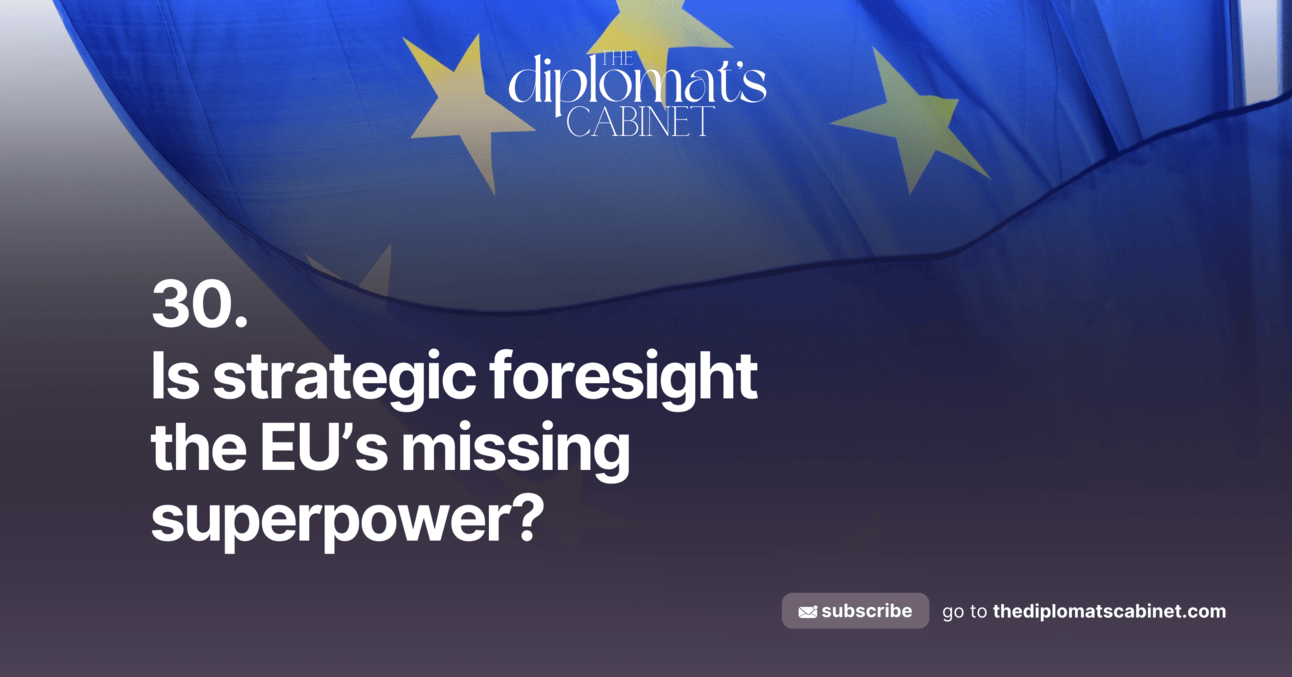- The Diplomat's Cabinet
- Posts
- 30. Is strategic foresight the EU's missing superpower?
30. Is strategic foresight the EU's missing superpower?
Welcome to The Diplomat’s Cabinet!
In this edition
We unpack key issues and debates in international affairs with a dash of analysis, curiosity and storytelling to make policy and diplomacy more accessible, engaging and human. Today that includes:
→ An editorial on EU strategic foresight
→ A news story that deserves your attention
→ Our guest-recommended brainfood and then jobs, tools and questions for diplomats at heart
The Cabinet asks…
Is strategic foresight the EU’s missing superpower?
When we talk about EU strategy, we often mean responses to war, to migration, to climate crises. But what if the deeper challenge is that the EU still struggles to anticipate, let alone shape, what comes next?

For all its global ambitions, its economic and political power, and even Von der Leyen’s call for a greater geopolitical positioning, the EU remains more reactive than visionary. Although not new to the EU, the concept of foresight, i.e. the discipline of exploring and anticipating possible future developments in order to shape the preferable future, could be the answer. The issue is that this analytical framework is often treated as a political accessory rather than what it should be: a central instrument of governance.
As Ricardo Borges de Castro argues in a conversation with The Diplomat’s Cabinet, the EU does not suffer from a lack of data or analysis, but rather from a poor institutional translation between strategic thinking and policy-making. Based on his years of experience inside and outside the European bubble, foresight, as Ricardo tells us, should consist of preparing the institutions for surprise and building governance models capable of acting before they are forced to react. At EU level, another major challenge is not necessarily just bureaucratic inertia, but the fact that national political leaders continue to have difficulty connecting and balancing long-term thinking with short-term political legitimacy.
So we ask: If the EU wants to be more than a crisis firefighter, how should it invest in creating tools (and trust) to predict what is to come?
🎧 Listen to full episode wherever you get your podcasts
One story to watch
Denmark’s military service now includes womenWhat’s happening:Denmark has introduced mandatory military service for both men and women, citing growing threats from Russia and the need to modernize the armed forces. Why it matters:The new policy marks a major cultural and strategic shift, sparking debate across Europe on gender, security, and civic duty. It redefines the social contract in an era of heightened geopolitical risk, as it forces both institutions and citizens to reconsider what equal participation looks like, especially when national defence is no longer voluntary. Denmark’s decision could become a model for similar debates across the continent. | Questions to consider:
 News source: Reuters |
Have you heard?
The Cabinet now in your ears
We could have just any conversation on world affairs, but we aim to make ours count. Each episode zeroes in on a specific theme, features a high-profile guest, and strikes the right balance between analysis and reflection, all in less than 30 minutes. Got a suggestion for a theme or guest? Hit reply!
Grow in and out of your 9 to 5 with
The toolkit for diplomats at heart
Your go-to space for curated brainfood, international career opportunities, industry reflections, and events shaping foreign affairs.
From our guest
“It is hard to prove a counter-factual, but my life without running would have been different. I cannot recall how many times, throughout the years, a run, in silence, solved my intellectual crossroads or deadlocks. I am not the only one. To better understand the amazing effects of running, I recommend Haruki Murakami’s What I Talk About When I Talk About Running. A must read.”
Ideas
The New York Times | The Interview: The Head of NATO Thinks President Trump ‘Deserves All the Praise’
The Atlantic | The Backdoor Way That Pete Hegseth Could Keep Women Out of Combat
Financial Times | European Security and the Limits of Trump Flattery
Foreign Policy | Gender Wars Are an Early Warning Sign for Authoritarianism
The Atlantic | Why Do So Many People Think Trump Is Good?
Jobs
🇺🇸 Obama Foundation | Analyst, Girls Opportunity Alliance
🇺🇸 Equality Now | Global Corporate Partnership Manager
🇫🇷 European Space Agency | Strategic Foresight and Planning Officer
🇫🇷 OECD | Policy Analyst, Regulatory Policy
🇬🇧 Center for Global Development | Programme Coordinator, Europe
🇵🇹 Lightsource bp | Community Engagement Manager
🇧🇪 European Institute of Peace | Programme Officer, Somalia
🇧🇪 European Endowment for Democracy | Grants Assistant (Eastern Europe)
🇧🇪 EPSO | Assistants in the field of Communication
🇦🇫 The New York Times | Afghanistan/Pakistan Bureau Chief
🇿🇦 Institute for Security Studies | Compliance and Reporting Officer
Opportunities
Real Instituto Elcano | Generación Europa para estudiantes y jóvenes profesionales (entre 18 y 30 años a 1 de enero de 2025)
Carnegie Endowment | Young Ambassadors Programme, India
European Commission | Public course introduction to DG ECHO Humanitarian Aid
Her Bold Move | 2025 Future Leaders Fellowship
Interested in featuring your opportunity or content here?
This newsletter reaches a highly engaged and focused community of industry professionals and enthusiasts across continents, with an open rate consistently above 67%. Get in touch to explore sponsorship options and reach an international audience.
That’s it for this week
Let’s keep the conversation going. Got feedback, ideas for the next edition, or interested in working with us? Hit reply! We’d love to hear from you.
Until next time,
Maria Luísa Moreira
Founder
The Diplomat’s Cabinet
